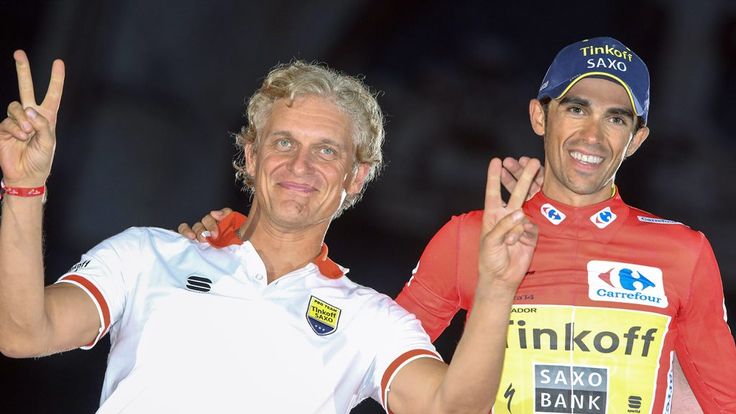Orla Chennaoui weighs up the pros and cons of Russian's €1m idea

Saturday 11 October 2014 11:33, UK
After all the excitement, anticipation and all-round hullabaloo, we won’t be seeing Fernando Alonso launch his attempt to revolutionise cycling in 2015 after all.
But there’s another suggestion for shaking up the sport as we know it, coming from a very different quarter, which is generating some interesting noise.
Oleg Tinkov’s offer of €1million to four of the world’s best riders if they battle it out across all three Grand Tours would be easy to dismiss as a great headline-grabber, were it not for the fact that some of the more cerebral figures in cycling seem to be taking it rather seriously.
Jonathan Vaughters, the manager of the team currently known as Garmin-Sharp, voiced his support for the idea on Twitter, pointing out that every other sport sees its athletes pitted against each other at the biggest events, while Sir Dave Brailsford, Team Sky’s principal, told us earlier this week that “seeing the best riders slug it out across the season at key races is what everybody would want to see”. In his opinion, having more of a “narrative throughout the season rather than just at one-off races” could only be a good thing.
It’s that narrative, the ongoing stories through the season and visible gladiatorial battles that attract the fans and sponsors needed to form the solid basis on which any sporting stability can rest.
There are, however, some very obvious arguments against such a proposal. But do they stand up to scrutiny?
First, there’s the pressure of having to compete at such a high level, for so much of the season. Wasn’t that one of the reasons cycling found itself embroiled in its hideous doping mess to begin with? Yes, but the culture of the sport has changed.
There is more concern for riders’ wellbeing these days. They’re looked after in a way they simply weren’t before. There is also a more scientific, sophisticated approach to performance and technology, which means gains can be made without reliance on the needle.
The more present risk is the temptation to put a proverbial sticking plaster on wounds rather than letting them heal. Tramadol is soon to be ruled on by the World Anti-Doping Agency and could be on the banned list for next year, but we would be naive to think that just as the painkiller was in danger of being used as a panacea for all racing ills, so banning it would stem the trend to try to legally race through the pain, to the detriment of an athlete’s health.
That’s a much bigger discussion for another day, but the issue is one to be addressed regardless of how much and which races the top riders choose to contest.
Then there’s the question of whether it’s even practically possible to contest all three Grand Tours. Even Lance Armstrong wasn’t foolhardy, reckless, or well “prepared” enough to do that.
Chris Froome recently repeated just how tough it is to ride two Grand Tours in a row, something he’s only done once. But Armstrong was only interested in domination, not variety.
And if we look at Adam Hansen’s ten back-to-back Grand Tours, we know that it is theoretically possible. Hansen is never going to be contesting a general classification podium place of course, but for those who are, maybe the reality is the three big races would be approached slightly differently.
Instead of the entire season being built around one race, ambitions would be spread out.
When both Froome and Alberto Contador withdrew from the Tour de France, we were all salivating at the prospect of what we would then see at the Vuelta a Espana. Few, if any, were overly excited before. Another epic battle, this time on different terrain, and with the likes of Nairo Quintana in the mix, was a thrilling prospect for fans. And a possible taste of things to come.
As for the gruelling demands of back-to-back Grand Tours, if everyone was in the same boat, wouldn’t that even out the competition? Would it change things to line up at the Vuelta against the same riders as throughout the season, rather than seeing some fresh and for the first time in a Grand Tour that year? I only ask the question, I don’t have the answer.
There is an argument that focusing on all three Grand Tours instead of just one, would take away from other races in the cycling calendar. If you look at the number of racing days Froome and Contador completed this year, for example, Froome would have been some 10 days short of racing three, three week tours, and Contador wouldn’t have had a day to spare.
Even if one of the Grand Tours is shortened, there wouldn’t be much room or energy left for other important, fan-friendly, revenue-generating races for the top contenders. Many of these races are for different kinds of riders anyway, and we know the entire calendar will be streamlined under Brian Cookson, the president of the International Cycling Union, but that to me would be a consideration that would need to be addressed.
I’m sure there are many more arguments and issues involved, and I write all the above with the open disclosure, were it needed, that I have never been a professional cyclist and so can’t comment on the exact toll and impact such a plan would have.
I’ll be interested to hear what they have to say should it come to that. What do you think?